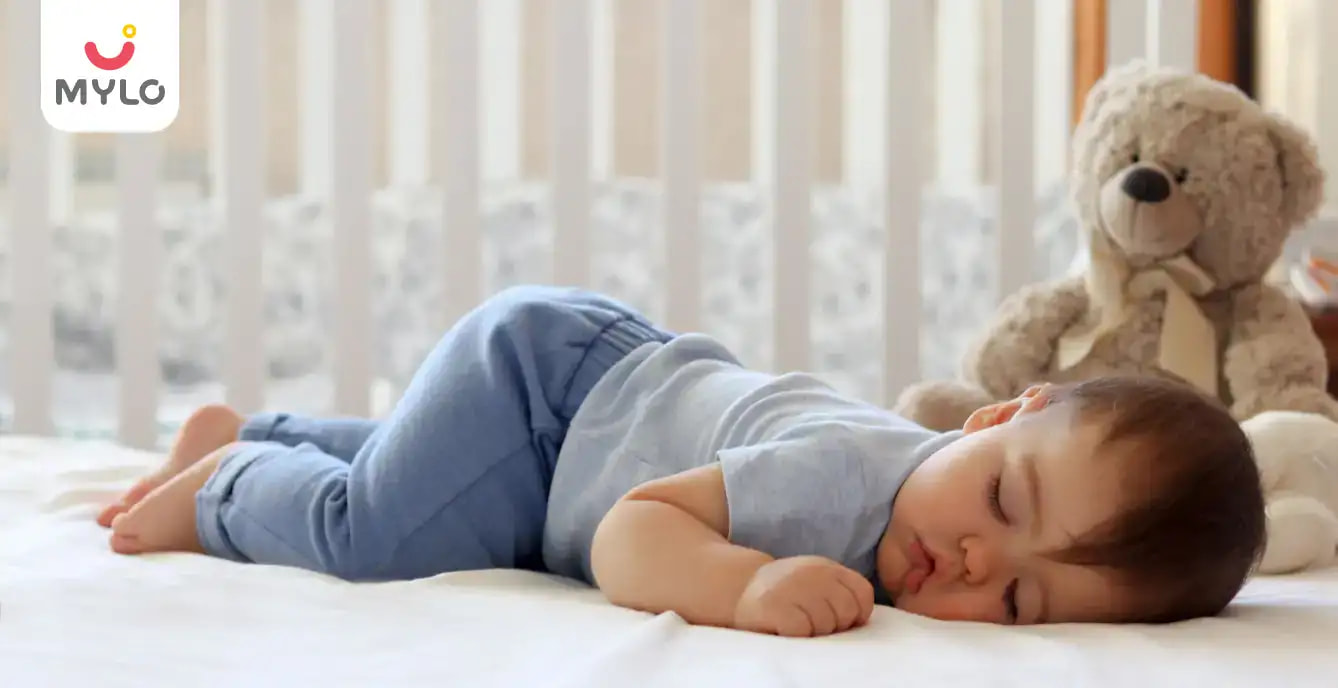- Home

- Best Sleeping Positions

- Baby Sleeping on Stomach: Risks & Advice
In this Article
Best Sleeping Positions
Baby Sleeping on Stomach: Risks & Advice
Updated on 3 November 2023
A good night's sleep is essential for both parents and babies. However, when it comes to putting infants to bed, parents often find themselves in a dilemma. One of the most debated topics is whether or not to let a baby sleep on their stomach. While some experts recommend tummy sleeping, others strongly advise against it. In this article, we'll explore the risks associated with baby sleeping on stomach and provide some advice on how to keep your little one safe while they snooze.
Is it Safe for Your Baby to Sleep on the Stomach?
Babies commonly sleep on their tummies. However, it is risky, and a baby who frequently sleeps on their stomach has an increased risk of sudden infant death syndrome (SIDS). If you realise your baby is rolling on his/her stomach, quickly turn your baby. Some infants, especially those a little older, can roll over from their backs or sides onto their stomachs. Avoid the baby sleeping position on stomach as much as possible.
Several studies state the dangers associated with baby sleeping on stomach and say that in the tummy sleeping position, an infant is more likely to "re-breathe" air that has already been exhaled. The risk is higher if babies have a pillow, soft mattress, or stuffed animal in their crib, as all this can obstruct breathing.
When is it Safe for Babies to Sleep on Their Stomachs?
Back-sleeping is recommended as the safe sleeping position for babies in their first year of life to reduce the risk of Sudden Infant Death Syndrome (SIDS). Placing babies on their stomach or side increases the risk of SIDS. This recommendation is valid for naps and nighttime sleep.
After turning one year old, babies can sleep in any position they prefer, but it is important to avoid placing any loose bedding, bumper pads, blankets, quilts, pillows, or stuffed animals in the crib. Tummy time is recommended during the daytime to strengthen the baby's head and neck, but it should be supervised by an adult.
What Happens If Your Baby Rolls Over on Stomach While Sleeping?
Newborns usually sleep on their backs for the first three months. There should not be much difficulty in shifting or moving the baby. Post the first three months, the baby learns to roll and may frequently fall asleep on the stomach after playing. Therefore, you should always be careful in placing the baby in the correct position and discourage baby sleeping on stomach.
If you find your baby sleeping position on stomach, it is generally safe to leave them in that position if they have passed the high-risk period for SIDS, which is generally by 4 to 6 months of age. There is little cause for concern if they sleep on their stomachs at night. It is also important to stop swaddling babies once they learn to roll over onto their stomachs.
If Your Baby Prefers to Sleep on Stomach, What Should You Do?
Some infants may discover that tummy sleeping is the most comfortable position for them. If you find your baby sleeping on tummy, it is essential to keep rolling your baby onto the back and continue doing this until they are big enough to roll over independently.
Advice on Sleeping
Here are some safety guidelines you can follow to make sleeping safe for your baby and reduce the risk of SIDS:
-
You should always place your baby to sleep on their back. If they happen to roll over on their side or tummy, gently nudge them to the right position again.
-
Even babies with acid reflux or gastroesophageal reflux disease (GERD) should sleep on their back.
-
You should use a firm, flat mattress instead of a soft bedding for your baby's crib or sleeping space.
-
You should share a room with your baby, but not a bed as it can increase their risk of being smothered or suffocated. If you must share a bed, then practice safe co-sleeping guidelines.
-
Babies shouldn't have any soft objects, including blankets, pillows, bumper pads, or stuffed animals, in their sleeping space.
-
Avoid letting babies sleep on couches, armchairs, or in car safety seats (except while riding in the car).
-
As soon as your baby falls asleep in a car seat, stroller, infant carrier, or sling, it is recommended that you transfer them to a firm sleeping surface on their back.
-
Instead of covering your baby with blankets, dress them in layers or use a wearable blanket to keep them warm while they sleep.
-
Don't let your baby get overheated while sleeping by maintaining an ideal room temperature and dressing them in only one more layer than you're wearing.
Key Takeaways
In conclusion, tummy sleeping is not recommended for babies due to the increased risk of SIDS and suffocation. It is recommended that babies be placed on their backs to sleep until they are able to roll over on their own. Parents can also reduce the risk of SIDS by creating a safe sleep environment, such as using a firm and flat sleep surface and avoiding loose bedding and soft objects in the crib. By following these guidelines, parents can help ensure that their baby gets a safe and restful night's sleep.
References
1. Creating a safe sleep environment for your baby. (2004). Paediatr Child Health.
2. Shapiro-Mendoza CK. (2017). Interventions to Improve Infant Safe Sleep Practices. JAMA.
3. Jullien S. (2021). Sudden infant death syndrome prevention. BMC Pediatr.



Written by
Loveleen Gupta
A working mother with more than two decades of experience in writing for the publishing industry and digital space, Loveleen Gupta loves dabbling in creative writing also. A graduate from Miranda House, she uses her personal experiences to express herself.
Read MoreGet baby's diet chart, and growth tips

Related Articles
Related Questions
Influenza and boostrix injection kisiko laga hai kya 8 month pregnancy me and q lagta hai ye plz reply me

Hai.... My last period was in feb 24. I tested in 40 th day morning 3:30 .. That is faint line .. I conculed mylo thz app also.... And I asked tha dr wait for 3 to 5 days ... Im also waiting ... Then I test today 4:15 test is sooooo faint ... And I feel in ma body no pregnancy symptoms. What can I do .

Baby kicks KB Marta hai Plz tell mi

PCOD kya hota hai

How to detect pcos

RECENTLY PUBLISHED ARTICLES
our most recent articles

Diet & Nutrition
গর্ভাবস্থায় আলুবোখরা: উপকারিতা ও ঝুঁকি | Prunes During Pregnancy: Benefits & Risks in Bengali

Diet & Nutrition
গর্ভাবস্থায় হিং | ঝুঁকি, সুবিধা এবং অন্যান্য চিকিৎসা | Hing During Pregnancy | Risks, Benefits & Other Treatments in Bengali

Women Specific Issues
স্তনের উপর সাদা দাগ: লক্ষণ, কারণ এবং চিকিৎসা | White Spots on Nipple: Causes, Symptoms, and Treatments in Bengali

Diet & Nutrition
গর্ভাবস্থায় পোহা: উপকারিতা, ধরণ এবং রেসিপি | Poha During Pregnancy: Benefits, Types & Recipes in Bengali

Diet & Nutrition
গর্ভাবস্থায় মাছ: উপকারিতা এবং ঝুঁকি | Fish In Pregnancy: Benefits and Risks in Bengali

Diet & Nutrition
গর্ভাবস্থায় রেড ওয়াইন: পার্শ্ব প্রতিক্রিয়া এবং নির্দেশিকা | Red Wine During Pregnancy: Side Effects & Guidelines in Bengali
- ইনার থাই চ্যাফিং: কারণ, উপসর্গ এবং চিকিৎসা | Inner Thigh Chafing: Causes, Symptoms & Treatment in Bengali
- গর্ভাবস্থায় ব্রাউন রাইস: উপকারিতা ও সতর্কতা | Brown Rice During Pregnancy: Benefits & Precautions in Bengali
- Velamentous Cord Insertion - Precautions, Results & Safety
- Unlock the Secret to Flawless Skin: 7 Must-Have Qualities in a Face Serum
- Unlock the Secret to Radiant Skin: How Vitamin C Serum Can Transform Your Complexion
- Gender No Bar: 10 Reasons Why Everyone Needs a Body Lotion
- Unlock the Secret to Radiant Skin How to Choose the Perfect Body Lotion for Your Skin Type
- Top 10 Reasons to Apply a Body Lotion After Every Bath
- Communication in Toddlers: Milestones & Activities
- How to Improve Vocabulary for Toddlers?
- A Comprehensive Guide to Understanding Placenta Accreta
- Vulvovaginitis in Toddlers Causes, Symptoms and Treatment
- A Comprehensive Guide to Understanding Cerebral Palsy in Children
- Bitter Taste in Mouth During Pregnancy: Understanding the Causes and Remedies


AWARDS AND RECOGNITION
Mylo wins Forbes D2C Disruptor award
Mylo wins The Economic Times Promising Brands 2022
AS SEEN IN
















At Mylo, we help young parents raise happy and healthy families with our innovative new-age solutions:
- Mylo Care: Effective and science-backed personal care and wellness solutions for a joyful you.
- Mylo Baby: Science-backed, gentle and effective personal care & hygiene range for your little one.
- Mylo Community: Trusted and empathetic community of 10mn+ parents and experts.
Product Categories
baby carrier | baby soap | baby wipes | stretch marks cream | baby cream | baby shampoo | baby massage oil | baby hair oil | stretch marks oil | baby body wash | baby powder | baby lotion | diaper rash cream | newborn diapers | teether | baby kajal | baby diapers | cloth diapers |





